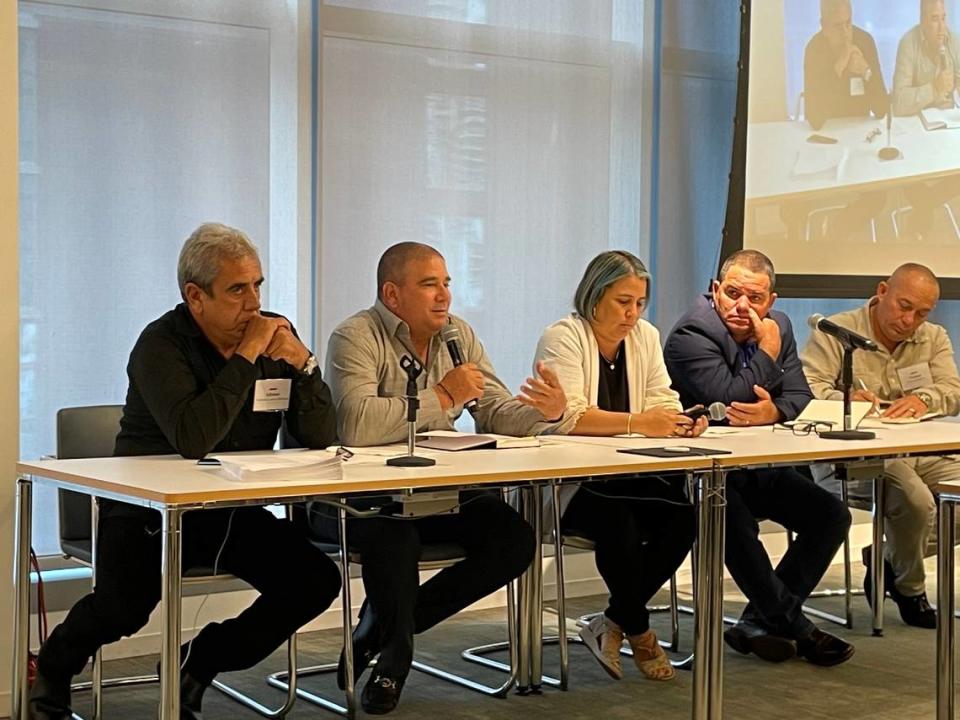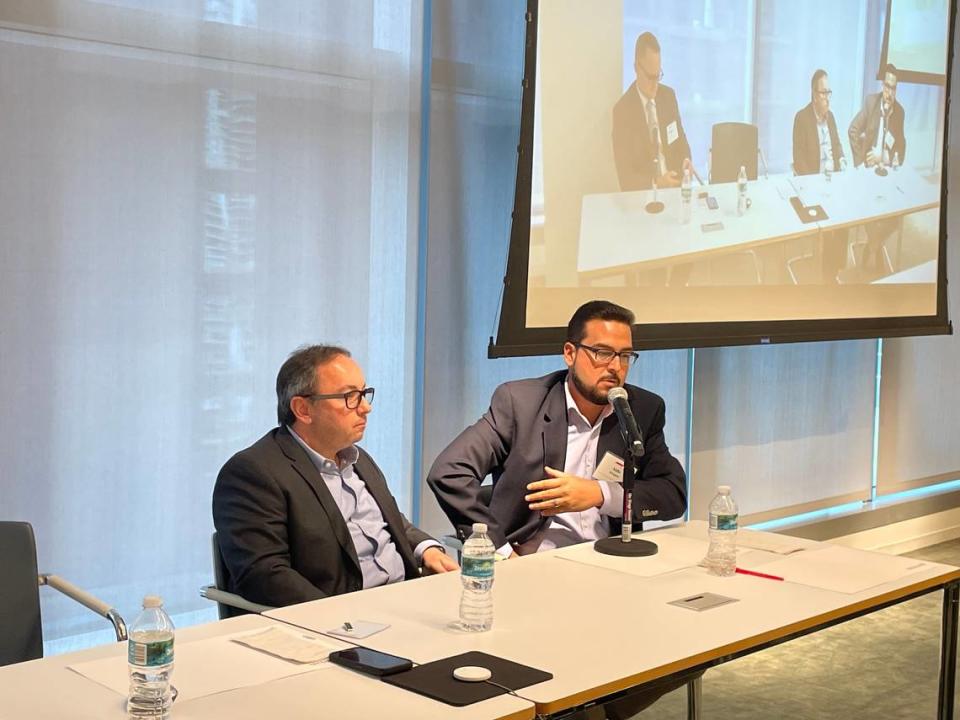In historic meeting, Cuba’s private entrepreneurs look for opportunities in Miami
For the first time since Cuba allowed its citizens to own private enterprises in 2021, a large group of about 70 Cuban entrepreneurs — some already selling millions of dollars in products and services on the island— have come to Miami to learn from successful Cuban Americans how to improve their businesses and hear from U.S. officials how to navigate the restrictions imposed by the U.S. embargo on the island.
The visit comes at a time both the U.S. and Cuban governments have said they are studying ways to provide more support to the private sector, whose sudden growth has taken many by surprise and has been the focus of controversy in Miami.
Some Cuban Americans helped plan the trip with renewed hopes that by supporting a thriving business community on the island, they could help change Cuba for the better.
“The Cuban American community believes that an essential part of a future democratic and prosperous Cuba includes a free enterprise system,” said former congressman Joe Garcia, who helped organize the trip and a two-day event at Miami-based law firm Akerman LLP that kicked off Monday with the welcoming words of another former politician: former Hialeah Mayor Raúl Martínez.
García, who does consulting for some companies doing business with Cuba’s private sector, said the basic idea behind the trip is to prove that these enterprises are real and not a front for the Cuban government, as critics in Miami have said.
“Of course, it can be destroyed tomorrow by the government if it wanted to, just like our regulations could destroy them also because the U.S. is the most natural market for business with Cuba,” García told the Herald.
The diversity and scale of some of the businesses represented in the Miami event showcase the revival the private sector has been going through since the Cuban government authorized Cubans beginning in 2021 to own small and medium-sized businesses, known as pymes.
Since then, some of these companies have become major employers and significant importers of food and other essential goods at a time when “the Cuban state is broke,” said Aldo Alvarez, whose own company, Mercatoria, has been importing large quantities of wheat, chicken and cooking oil to sell on the island.
What Cuba’s businesses want from the U.S.
The group comprises men and women from various Cuban provinces, some of whom have never been to the United States. They own businesses in several sectors, including transportation, construction, software development, clothes and beauty products and manufacturing.
They all appear eager to take advantage of the coveted trip to the United States.
Many said they are looking to cut costs and prices by contacting providers directly so they don’t have to buy from resellers. Others are searching for a market and partnerships to help them scale their operations.
Zoraida Perez Barrera has a small but successful women’s and baby clothing business in Santa Clara, a city in central Cuba with 14 employees. Before she created her brand, Zory, and founded her company — one of the first approved in 2021 — she had been selling hand-made clothes for 15 years as an independent artisan.
Now, she believes she may find a market in the United States. Despite the embargo on trade with Cuba, the U.S. allows the import of most goods produced by independent Cuban entrepreneurs.
“One of the things I hoped for with this trip would be to try to find someone here who would be interested in selling my productions,” she said. “All of us who are Cuban know how rooted we are in our traditions and I make the traditional newborn arrival clothes. In fact, people who live [in Miami] ask us how to buy the baby clothes.”
José Ignacio Ramos Gámez and Daimara Sevilla Aguilar run a clothes manufacturing business in Havana, making sports and casual clothes, which they sell in their own private shops to other private enterprises and state companies. They have a sewing workshop in Guanabacoa, just outside of Havana, they have recently imported the machines for a second one, and hope to find a partner that wants to make clothes in their new facility.
Several entrepreneurs said they are particularly encouraged by news reported by the Miami Herald that the Biden administration is readying to announce new regulations allowing Cuban private entrepreneurs to open bank accounts in the United States —something they can’t do now because of the U.S. embargo that would make it easier for them to pay providers abroad.
“I feel super hopeful with all these measures that President Biden is announcing; the bank account news is wonderful,” said Nidialys Acosta. She and her husband run Nostalgicar, a vintage car-ride business catering to tourists. “We are not asking for money, loans or credit; we are asking for the possibility of carrying out negotiations independently without people having to mediate.”

While some of the entrepreneurs in Cuba run small operations, others have manufacturing facilities with the latest technologies. D’Cabellos SURL has its own plant in Camajuaní in Villa Clara, where it produces beauty and hygiene products. According to a company press kit, the enterprise has been active since January last year and has sold $2.2 million worth of products.
During the Miami event this week, the Cuban business owners heard from Akerman lawyers and U.S. officials from the Departments of State, Treasury and Commerce, who explained the regulations that allow American companies to export goods to the Cuban private sector. Though the embargo generally prohibits any transactions involving Cuba, the Obama administration eased restrictions on transactions if the final beneficiary is a member of the private sector, not the Cuban government.
But it is not a straightforward process because it requires navigating the U.S. restrictions and applying for licenses from Treasury and Commerce. And sometimes American companies, like Crowley Maritime, a shipper that sends cargo containers to Cuba, ask companies exporting to the island to obtain additional authorizations because they worry about compliance with the embargo rules, Pedro Freyre, a lawyer with Akerman, said.
And much economic activity remains prohibited.
Several Cuban business owners asked whether they could open a company in the United States to either sell their products or buy supplies directly from American companies.
That’s not allowed by the embargo.
What about a Cuban American who wants to have a business in Cuba?
That’s also a No, unless the person has permanent residency in Cuba. That might change if the Cuban government approves it. Cuban officials last week told a group of Cuban Americans who were meeting with Cuban leader Miguel Díaz-Canel in New York that they are moving in that direction.
Cuba is considering letting Cuban Americans own private businesses on the island
Some of the Cuban Americans who met with Diaz Canel were also in Miami meeting this week with the Cuban entrepreneurs, including two of the largest Miami exporters to Cuba’s private sector: Hugo Cancio, the owner of Katapulk, a marketplace for over a hundred private enterprises, and Ariel Pereda, whose company, Pearl Merchandising & Distribution, first started selling food to Alimport, the Cuban state monopoly, and now is primarily exporting to the private sector.

“That Cuban businessmen from both sides of the Florida Straits meet, exchange, collaborate and explore joint opportunities in Miami is not only historical, it is the future,” Cancio told the Herald. “At Katapulk we already collaborate with many of these [Cuban entrepreneurs] present here. Now, we are also exploring investment and partnership opportunities.”
Changes are going to “take time,” Pereda said, and the Cuban government bureaucracy still bogs down trade with the private sector. But he urged the entrepreneurs attending the event to do everything “by the book” to gain the confidence of U.S. companies and banks.
Cuban Americans in attendance said they are watching the rise of private business in Cuba and that the U.S. government should do more to support these entrepreneurs. Many remain skeptical about whether the Cuban government will continue to allow private businesses to thrive. since in the past, it has shut down similar efforts, more recently during the Obama era.
“I always look at these things having to do with Cuba with a grain of salt,” Freyre, the Akerman lawyer, said. “However, I do think that the economic situation in Cuba has changed the landscape in a very basic way. What has been a pleasant surprise for me is the volume, the level of activity, the inventiveness of the private sector, their persistence.”
Whether Cuba continues to allow this in the long term “we have yet to see,” he added.
The event “is a credible signal that this is not just five people from Havana, but a wide spectrum of businesses,” healthcare executive and billionaire Mike Fernandez told the Miami Herald.
Fernandez, who gave a keynote speech to the entrepreneurs, said he believes Cuba’s new private businesses are “the beginning of something monumental that it will change” Cuba, though he said there is always the threat that Cuba could “reverse the process” if it finds other ways to resolve its economic crisis.
Many Cuban Americans attending the event said they took for granted that the Cuban government, which is known to embed its intelligence agents in groups traveling to the United States, was aware of the discussions happening in the Akerman offices.
Fernandez addressed the elephant in the room during his speech to the entrepreneurs with tips on how to succeed as capitalists, joking at one point: “How many state security agents are in the room?”
